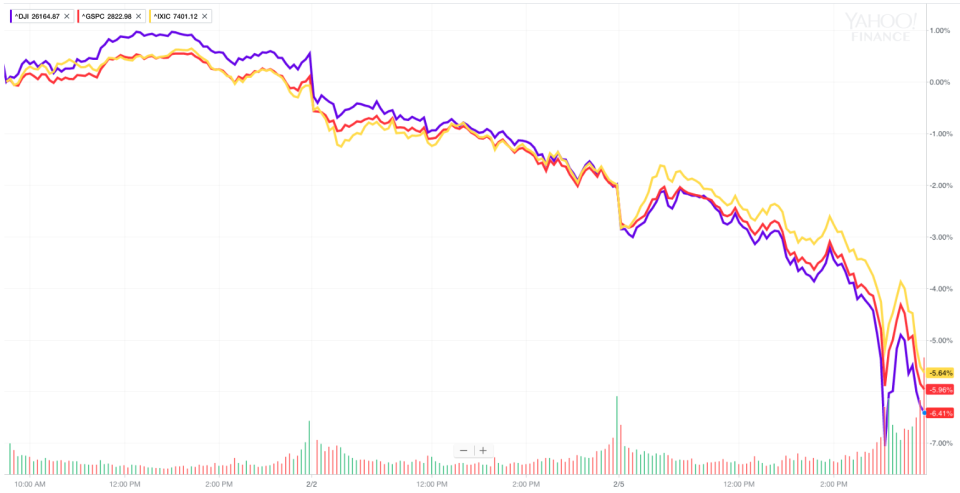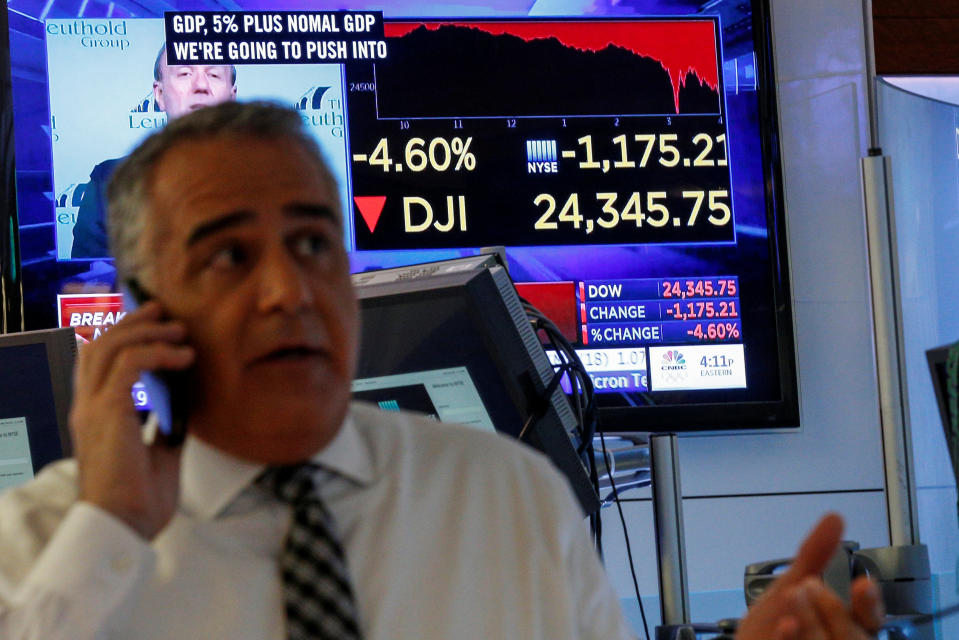Disney earnings, market volatility — What you need to know in markets on Tuesday
On Monday, the Dow Jones Industrial Average recorded its largest single-day point decline in history.
The blue chip index fell 1,175 points, or 4.6%, to bring its year-to-date performance into the red. The Dow has now lost 1.5% this year.
The benchmark S&P 500 and the tech-heavy Nasdaq also fell sharply on Monday, with the S&P declining 113 points, or 4.1%, and the Nasdaq losing 273 points, or 3.8%. These declines were the worst single-day losses for the market since 2011 and make clear that after a placid 2017 in which stocks seemed to float higher for much of the year, volatility has returned.

On Tuesday, investors will face a busy earnings schedule with Disney (DIS), General Motors (GM), Chipotle (CMG), and Gilead (GILD) all set to report results. Disney, and specifically results at its ESPN unit, will be the biggest focus for markets.
The economic calendar will bring investors reports on the trade balance in December as well as job openings during the month.
But as Monday showed, earnings and economic data may matter, but right now the market action is being fueled by emotion, by the rocky transition between phases of life.
At the end of 2017, complacency and certainty were the prevailing themes in markets. Earnings were expected to be strong and economic growth was forecast to be its best in years. Wall Street strategists uniformly expected a further rise in the stock market; the only question was to the magnitude of these gains. The market’s next chapters had already been written.
And while another consensus call is that 2018 would be more volatile than 2017 — which was one of the least-turbulent years on record — the action seen Monday is almost certainly not what was meant by “more volatile.” As markets entered the final hour of trading on Monday, the bottom seemed to be falling out of the market. The Dow fell 1,500 points, reporters looked up when circuit breakers would be tripped, and fear was the overriding emotion on Wall Street.

After the markets closed Monday, futures broke lower. The selling pressure did not end with the bell. Trading in overseas markets Monday night into Tuesday will certainly set the tempo for U.S. investors on Tuesday. But no matter what markets do in the days and weeks ahead, the market environment so many investors knew was lulling them to sleep in 2017 has clearly ended. Investors have been jarred awake.
As for why the markets went down on Monday, the rise in bond yields is the most obvious culprit. Warren Buffett, among others, has long made the argument that low interest rates make stocks more attractive on a relative basis; higher yields, in turn, make stocks less attractive.
Rich Barry, floor governor at the New York Stock Exchange, also notes that Friday’s jobs report — which augurs for a more aggressive rate hike program from the Federal Reserve this year — along with higher yields, a stabilizing U.S. dollar, and soaring investor sentiment combined to set the table for a decline in stocks.
“The word we are getting now from traders is that markets should be very choppy over the next few days,” Barry said in an email after the market close. Volatility in markets often begets more volatility. But that investors are likely to point to a series of factors, and not one cause, for the market sell-off explains why the decline is unsatisfying and confounding.
—
Myles Udland is a writer at Yahoo Finance. Follow him on Twitter @MylesUdland
Read more from Myles here:
One candidate for Amazon’s next headquarters looks like a clear frontrunner
Tax cuts are going to keep being a boon for the shareholder class
Auto sales declined for the first time since the financial crisis in 2017
Foreign investors might be the key to forecasting a U.S. recession
It’s been 17 years since U.S. consumers felt this good about the economy
